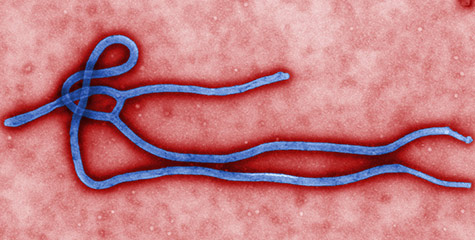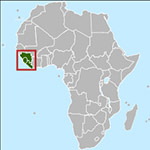
Ebola has grabbed national headlines in recent weeks, but efforts at Washington University to safely coordinate a response to the virus have been underway for several months.
To ensure that health-care workers are prepared, the School of Medicine, Barnes-Jewish Hospital and St. Louis Children’s Hospital are training those designated to be on the front lines of diagnosing and treating patients with the virus. This includes drills in which mock patients enter the hospital with symptoms that simulate Ebola, and staff members run through the process of diagnosis, isolation and treatment.
If traveling to or from West Africa

Washington University faculty, staff and students traveling to or from Ebola-stricken Sierra Leone, Liberia or Guinea for university-related or personal reasons are encouraged to:
— Record travel plans using the university’s International Travel Registry, which helps the university monitor and assist international travelers in emergencies and times of crisis.
— Seek pre-departure travel advice from the School of Medicine’s Infectious Diseases International Travel Clinic, 314-747-1206. The clinic’s physicians can recommend precautions to help keep you safe.
— Undergo a health screening by telephone before returning to work or class. On the Danforth Campus, contact Alan Glass, MD, director of the Habif Health & Wellness Center, 314-935-9626; on the Medical Campus, contact Jennifer Reneau, RN, in Student and Occupational Health, 314-362-3528.
Source of map: CDC
“The rigorous planning on the Medical Campus is aimed at ensuring that faculty, students and staff, as well as patients and visitors, are as safe as possible at all times, and that we are fully prepared to evaluate and treat any patient suspected of having Ebola,” said James P. Crane, MD, associate vice chancellor for clinical affairs.
The medical center’s efforts also have been carefully coordinated with Student Health Services on the Danforth Campus. Washington University’s offices of emergency management on both campuses also are closely involved in the planning.
“It’s extremely unlikely that we would have a student or faculty member with Ebola on the Danforth Campus,” said Alan Glass, MD, director of the Habif Health & Wellness Center. “But our population is global and mobile, and it’s essential that we’re prepared.”
The current Ebola outbreak is a major public health emergency in the West African countries of Sierra Leone, Guinea and Liberia. Although a handful of cases have been reported in the United States, the likelihood of a widespread Ebola outbreak in this country remains very low, said Steve Lawrence, MD, a Washington University infectious diseases physician at Barnes-Jewish who is involved in the medical school’s preparedness efforts.
“There’s a lot of anxiety among the public right now,” Lawrence said. “While it’s likely we will continue to see isolated cases in the U.S., we have an extensive public health infrastructure and the ability to diagnose and treat patients with Ebola to limit its spread within our borders.”
Despite the public’s concern about Ebola, the virus is not easily transmitted, and infected patients are not contagious until they have symptoms, such as fever. People who have been exposed to Ebola but don’t have symptoms can’t spread the virus.
To become infected, a person must have direct contact with the blood or other bodily fluids – saliva, vomit, urine and feces – of someone with Ebola who also has symptoms of the illness. Unlike the flu and other respiratory infections, the Ebola virus does not spread through the air.
Washington University clinicians have extensive expertise in infectious diseases, infection prevention and emerging infectious diseases. As the current outbreak has unfolded, the university’s and the hospitals’ plans to screen, diagnose and treat patients with Ebola have been revised based on the latest information and updated guidance from the U.S. Centers for Disease Control and Prevention. The university and the hospitals also are coordinating their Ebola efforts with state and local health officials.
“In recent weeks, we have focused on training medical staff to screen patients for Ebola symptoms and Ebola exposure history at major points of entry into the medical center, including emergency rooms and clinic areas,” Crane said. “Working with the hospitals, we also have organized treatment teams and designated locations for treating Ebola-infected patients, with an emphasis on safety for our health-care teams and our patients.”
If a patient with Ebola comes to Washington University Medical Center, he or she would be cared for by a limited number of health-care workers to lessen exposure to the virus. Physicians, nurses and other workers who would have direct contact with an Ebola patient also have been trained to properly put on and remove personal protective equipment to prevent accidental exposure to Ebola.
The CDC recently implemented a plan for monitoring travelers, including Americans, who arrive in the U.S. from Sierra Leone, Guinea or Liberia. Travelers from those countries who do not have Ebola symptoms upon arrival will be required to monitor their temperatures twice a day for 21 days (the incubation period for the virus).
Arriving passengers will be asked to check in daily with state or local health departments to report their temperatures, any Ebola symptoms and travel plans, whether in or out of state. If a traveler does not check in, public health officials are to take steps to locate the person and ensure that active monitoring continues.
“The CDC plan is preferable over an outright travel ban,” explained Lawrence. “Travel bans can inadvertently push sick travelers underground and, in this case, would hamper U.S. humanitarian aid and medical workers from reaching the countries most in need of medical care to stop the outbreak from spreading.”
For more information about Washington University’s efforts to respond to the Ebola virus, see emergency.wustl.edu.
For more information about the Ebola virus, visit the CDC website.